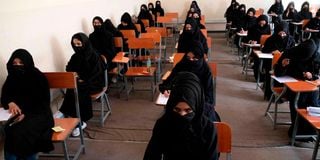The Asian country breathing life to oppressed Afghan women

In this file photo taken on October 13, 2022, Afghan female students take an entrance exam at Kabul University in Kabul. - Afghanistan's Taliban rulers on December 20, 2022 banned university education for females nationwide, as the hardline Islamists continue to crush women’s right to education and
freedom.
What you need to know:
- The 2023 edition of the global Women Peace and Security Index ranked Afghanistan the worst country in the world for women to live in.
- Since the Taliban took over the country’s leadership on August 15, 2021, it has imposed many restrictive rules on women and girls
By last year, Afghanistan was the worst country in the world for women to live in.
The 2023 edition of the global Women Peace and Security Index published by the Georgetown Institute for Women, Peace and Security and the PRIO Centre on Gender, Peace and Security, ranked it the last among the 177 countries, assessed in terms of women’s inclusion, justice, and security.
Worst it is, that since the Taliban took over the country’s leadership on August 15, 2021, it has imposed many restrictive rules on women and girls that the United Nations now describes as gender apartheid.
Various courses
One of them is banning Afghan women from university education.
But there is one country raising the hopes of Afghan women of pursuing their dream careers: Kazakhstan, a country in Central Asia.
By 2021, the year the Taliban took control over Afghanistan, 229 professionals were off limits to women in Kazakhstan.
For instance, they could not be railway wagon inspectors, crane operators or lorry drivers. Later, the ban was lifted and now women from Afghanistan can enrol for various courses including those of science, technology, engineering and mathematics.
According to the United Nations Development Programme (UNDP), between 2019 and 2025, 50 Afghan women students will attend bachelor’s, master’s and technical and vocational education and training degrees in agriculture, applied statistics and mining at universities in Kazakhstan. They will also be enrolled in Uzbekistan, another country in Central Asia.
This is courtesy of a UNDP project launched in 2019, through the funding of the European Union, enabling women students from Afghanistan to study elsewhere.
At the end of the training, the Afghan women would be ready to “create new business and employment opportunities for Afghan women and their communities back in Afghanistan.”
Their fellow women back home have greatly suffered.
A month after Taliban’s take over, they imposed an education restriction that women would only attend universities with gender-segregated entrances and classrooms. They were also to be trained by only women professors or old men. They also made it mandatory that all women students wear hijabs.
This was followed by another edict; Afghan women should not travel more than 72km without the company of a close family member.
In March, 2022, the militant rulers stopped learning of girls in middle school and high school. At the same time, they introduced gender segregated entry to the parks; women were permitted to visit parks on Sunday, Monday and Tuesday, while the remaining days were reserved for men.
The strings of prohibitive orders kept coming. Then in May, the same year, Taliban supreme leader Hibatullah Akhunzada issued a decree, tossing another brutish order.
He directed women to wear head-to-toe burqa in public. Should they fail to adhere, the woman’s father or closest male relative would be imprisoned or fired from government jobs to pay for her ‘crime’.
This was not all. In November, seven months later, they imposed a more radical rule that no more parks and gyms for women. The groups said they had to cut women out of the facilities because they flouted the gender segregation order.
“We have seen both men and women together in parks and, unfortunately, the hijab was not observed. So, we had to come up with another decision and for now we ordered all parks and gyms to be closed for women,” Aljazeera quoted Mohammed Akef Mohajer, a Taliban-appointed spokesman for Ministry of Vice and Virtue.
Higher education
Then on December 20, they hit again. They banned women from university education.
“You all are informed to implement the mentioned order of suspending education of females until further notice,” the Guardian quoted a letter issuing the directive signed by the minister for higher education, Neda Mohammad Nadeem.
The international outlet said the ministry’s spokesperson, Ziaullah Hashimi, who tweeted the letter, confirmed the order in a text message to Agence France-Presse.
The latest gender-oppressive directive has drawn a huge global uproar, which has morphed into an X (formerly Twitter) protest under the hashtag #AfghanWomen.





